Momma Interviews "Expert Edition" featuring Amanda Zaidman
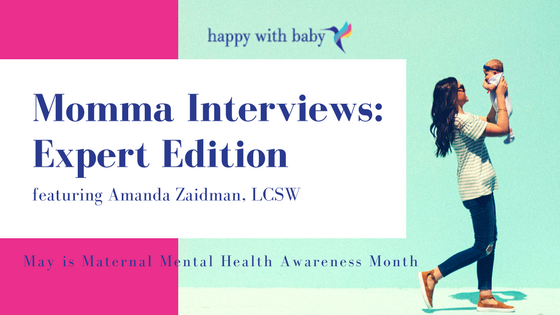
May is Maternal Mental Health Awareness Month, so I've relaunched my "Momma Interviews" series--This time with an extra special set of moms. These mommas also work to support other moms and their families during the transition into new parenthood and beyond. I'm calling it the "Expert Edition", but I think you'll find that while these women definitely are experts in their work, parenthood has a way of making a beginner out of everybody. Even experts get surprised by the unexpected and learn new bits of wisdom while in the trenches!
This series is all about their experiences with motherhood, in the hopes that it provides you with some validation and new tips to try. Because for all the many different ways there are to be a mom (and there are definitely MANY ways to do it right), it's so amazing how much we moms all really have in common.
Today, I'm chatting with Amanda Zaidman, LCSW, a parenting coach and mother of two from Charlotte, NC.
Amanda is a mom who prioritizes growth over perfection, mindfulness and dancing to good music. I love her honesty about her struggles with her first baby and how motherhood has changed how she views her own mother.
Scroll down to watch the video, read the transcript or learn more about Amanda below.
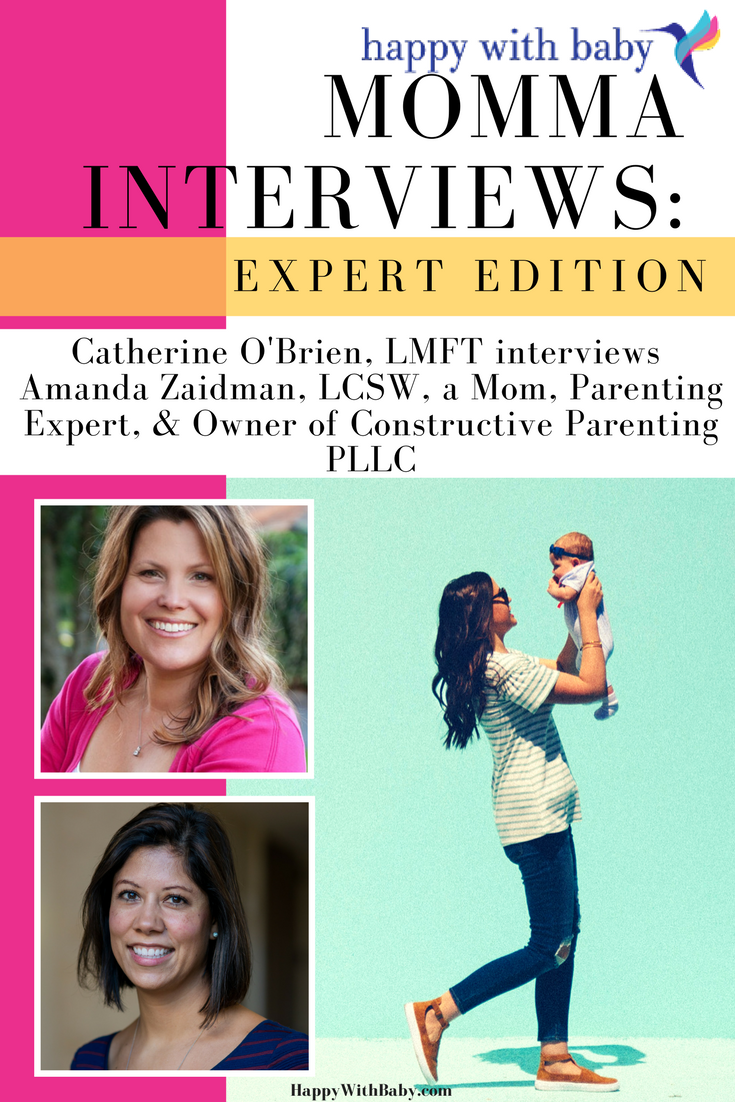
Watch the video:
https://www.youtube.com/watch?v=_kZchi_PRdM&w=854&h=480
Amanda's Quotables:
Interview Transcript:
Catherine: This is Catherine O'Brien again at happywithbaby.com, and I'm doing another one of my expert interviews with mommas around the country. I'm so excited because Amanda Zaidman is here with us today, and she is a LCSW in Charlotte, North Carolina and has her own private practice. So thank you so much for being with us. I'm so glad you could join us.
Amanda: Thank you for having me.
Catherine: Yeah. So why don't you tell us a little bit about your family? What's your family dynamics?
Amanda: Okay. So I have two children. I have a daughter, Maia, she's nine years old and she's in third grade. And then we have a son, Jonah, who his eight years old and he's in second grade. And then I'm married. My husband is Jess.
Catherine: Okay. Cool. So tell me about how do you balance being a mom, working, and your relationship goal?
Amanda: Well, so for me it's ... The balance really is leaning more towards prioritizing my family. In terms of balancing career, and family, and so that meant when I got pregnant with our first child I decided to take time off from my career. I'm a clinical social worker, and so at that point I was working in an agency, and honestly the salary I was making would have probably barely covered a nanny, and I was working with children and I love children. So my husband and I talked, and it really made sense for me to take that time and spend it raising our kids, being a stay at home mom. And then during that time I prioritized my career, just keeping up with my CE's because I knew I wanted to go back, but I was home until both my children were in elementary school.
And then with my husband, when they were young it definitely took a toll on our relationship but as they've gotten older it's easier to prioritize that alone time, spend time one-on-one together.
Catherine: Yeah. Yeah. I know it's always ... I feel like it's a constant adjustment of how get ... How you do all those things, because especially as they grow, and age, and their needs and such change it's a constant adjustment. So I talked to a lot of moms and they often speak about moments when they're ready to throw in the towel. Have you ever had one of those moments, and can you describe that and what ... Why you felt that way and what got you through it?
Amanda: Thinking about that I think the clearest time for me was when I had my first daughter, my first child. She, for six weeks, was really hard. She had trouble learning how to latch, and so we had a lactation consultant. It was really important to me that we try to figure that out. I was willing to use formula if that's what we needed to do, but I wanted to try everything else first. And it was a very vulnerable time. You're having people touching my body that way, and then not being able to ... It wasn't working. And so I would have to pump every feeding and then after we were done ... After I was done pumping I would try to nurse for five minutes and then when it didn't work, I would feed her the bottle.. And so we did six weeks of that. I think a hard piece too was that then we were seeing everything she was getting.
And so she was starting to learn how to latch, and my husband would say "How do you know she's getting enough?" Which, of course as a father looking back that makes perfect sense. You saw what she was getting and now we're not sure. We could see her weight going up, but it felt like an attack in a way. It's just your body feeding her. How do we know that you're really able to do it? So that was a really hard time for us. But she did learn to latch and she got older, and it got so much easier.
Catherine: Yeah. Yeah. No, it is ... It's exhausting. That's an exhausting process, and doing all those steps, and being a new mom, and having all those doubts and stuff like that. It definitely takes a toll. And I know I've heard that from other families and stuff too. So what do you do when you feel overwhelmed, over stretched, or less than?
Amanda: Well typically if I am feeling really overwhelmed I go to my husband. He's really my rock. He's very supportive. When I'm upset he takes it seriously and he gives good advice. And I also try to prioritize time, downtime for myself. So whether that's yoga, or meditation, or spending time with my friends, that sort of thing. That's what I do when I'm feeling stressed.
Catherine: Yeah. That's good that you have that support. I've also had parents tell me that one of the hardest things about being a parent is comparisons and judgements from other parents. Have you experienced that, and then how do you cope with that?
Amanda: Well in terms of judgements, that's not really been a big issue for me just because I think I tend to gravitate towards women who are kind and supportive. Who are wise and that's just the people I want to be around. And so the judgment piece I believe ... I can't think of a time when that's a been a big issue. But the comparison piece does sort of play in there because I'm ... The people that I'm with I'm in awe of them a lot of times, so trying to keep up with either what they're doing with their kids, or their career, or they decided to do private school so what opportunities do they're kids have that mine aren't getting, or just always comparing in my own mind. When that happens I try to ground myself and recognize that that's not what's important. That that's not why we're friends. That's not important to them. Maybe we all play this game in our heads, but I'm not thinking that about them, "Oh what are they doing," or "What are their kids doing?" But I think it is very hard, it's a challenge to remember to just try to worry about myself in a sense.
Catherine: Right. Right. Yeah, it's almost like coming up with a mantra or something in your head. Like, "It's just me that we have to worry about. Our family and not everybody else's," because there's such a dynamic for ... Everybody has a different dynamic, and different needs, and it's not even fair to compare. So I know that's easier said than done. So what do you feel is your greatest personal struggle with the experience of motherhood?
Amanda: I think, for me something I do struggle with is self-judgment. I think a lot of it was alluding to that already, but even just ... I've thought a lot about what it meant when I took that time off to be home with my kids. I spent so much time working hard to prove myself through my grades, and then in a career, and there was always something almost tangible. I got the A, or I got the raise, or I got the pat on the back. And then being home with my children it didn't feel that way. I gave more of myself than I'd ever done before, but it doesn't end. The dishes are always there. The laundry's always there. Someone always needs you. So that has been hard, and I think I hold myself a high standard. How do you know that you're doing it right?
And it's hard at times to not take things personally when really it's just I'm raising my children. They're their own people, they're not me. But when things don't go well, like when my daughter didn't nurse, when my kids needed bk, even every time my son talks back and refuses to do what we've asked him to. Just very typical things. It's not always easy to just normalize and that say, "They're being their own person. I'm doing my best to be a good mom." But I think having the background that I have in child mental health, and now recreating myself as this parenting expert, it's hard to remember "Okay that's being a parent. Being someone who understands parenting well doesn't mean you're a perfect parent. And that's okay."
Catherine: Right. There's no such things as the perfect parent. Yeah, but it's definitely easy to be like, "Oh no, they're doing this. Somehow that is a reflection like I'm being a bad parent." When it is, so much of it is this typical child development stuff that they have to go through to become their own person. So that's a good reminder. So tell me something that has surprised you about being a mom that maybe you didn't realize you'd enjoy, or something you didn't know that kids did. Because I know for me I have this similar background in child mental health as well, but having my own kids totally woke me up to like, "Oh wow. I didn't realize this happened." Or something you didn't know could bring you so much joy. Like what do you love about being a mom?
Amanda: I didn't know that it would feel like this. I'm a pretty connected person. I feel my emotions large with my friends and my family, so it's not a shock that I would feel this way, but what it feels like to just give so much to this little person and then send them off. I remember when my daughter went to preschool for the first time, and I was like "I can't ... How is she functioning right without me by her side?" And she came home with little stories of this life she's creating and it was amazing. But it is, all of those feelings are so big. When something goes well, just feeling so happy. When something bad happens to one of my kids, feeling scared for them. And just, I didn't realize that it would be like this.
And it's getting exciting. They're seven and nine ... They're eight and nine actually, and so they're at ages where it's just really fun. They don't need me as much. They're doing things on their own. Sometimes things that I don't even understand. Like the work they're bringing home or the chess clubs or whatever. So there's a sense of them being their own person, and I love it. I love learning from them. Yeah.
Catherine: Yeah, no it is fun. So tell me about your relationship with your partner. How has that changed and/or how has that stayed the same?
Amanda: It's definitely very different. Our relationship before we had children versus now. It was easy before we had kids. We were always pretty much on the same page. Having children makes everything more complicated. It makes it harder. But it feels like, having done it this long, we're a team and we depend on each other and count on each other's perspectives, which often are different. But we each bring something to the table. But yeah ... I mean, I think I notice we went away for our anniversary to Napa for a week and it was like "Wow. This is what it's like to be with just you and I having fun without kids. It's so easy we don't even fight about anything."
So that's ... It's harder. But again, he ... I don't know ... I can't imagine doing it without him. It's worth how hard it is. I'm amazed by the father that he is to our children.
Catherine: Yeah. Yeah. I know that's awesome to hear. And it is good to have those times where you can reconnect, and you're "Oh yeah. I really like being with you. Everything's not always a battle. I like being with you. So this'll be good when they move out."
Amanda: Yeah. Right?
Catherine: Cool. So what about relationships with friends, family, or other support systems? How has that changed or stayed the same?
Amanda: Well you mean since I've had children?
Catherine: Yeah.
Amanda: So I've always, I think friends and family have always been super important to me. Spending time with others. I'm not ... I'm an extrovert. And that has been consistent, but as I've had my own children I think the biggest change maybe has been the way that I look back at my own childhood and all of the sacrifices that my parents made. The respect that I have for my mom for everything that she did. She couldn't have kids right away, and so she adopted me, and she had two more with my father. But he then was diagnosed with brain cancer before she actually delivered my youngest brother. So he died when I was, well when I was almost five. And then she remarried.
So there's a lot of drama in the beginning and things to smooth out. And my mom remarried, and my stepdad is amazing and I don't think of him as a stepdad at all. But I knew that. I lived that. And then I became that age when my mom would have found out that my dad was sick, and the age when my dad died, and just thinking about how strong she was, and how she's there for us, just gave a new perspective, a whole new dimension to our relationship.
Catherine: Right. Right. Well that's cool. So what's the greatest lesson, or one of the lessons, that you've learned about as being a mom?
Amanda: Well I did take this course I learned at ... From a parent educator. Elizabeth Crary. It's called star parenting. I became a facilitator in that, but she has a mantra that's "A star parent is a growing parent, not a perfect parent."
Catherine: Oh, I love that.
Amanda: And I think that just rings true to me that, that's my goal. I really ground myself in that when I'm struggling, when I'm comparing myself, and I'm judging myself that any little growth. That's my goal. I can't be perfect and that's okay, but I want to do better. Everyday I learn something.
Catherine: Yeah. No, I love that. It's not perfect parent, it's a growing parent. Is that what you said?
Amanda: Mm-hmm (affirmative).
Catherine: Yeah. That's so perfect. Yeah. So a favorite quote that inspires you as a mom? I think that's a pretty good one, but any others?
Amanda: Yeah I guess it is the one that I think of. I don't know. I'm just thinking ... Yeah. That's the quote that stays with me.
Catherine: Yeah. Yeah. Cool. How about favorite song that inspires you as a mom, or makes you think of being a mom?
Amanda: There's a song by Sara McLachlin, the ice cream song. "Your love is better than ice cream. Your love is better than chocolate." That was playing once when ... We have a lot of music in our house usually, and that was playing once when the kids were around me. And I always just thought it was a pretty song and it [inaudible 00:15:03] thinking about how much I always thought about it in terms of my husband. How much I love him. But when my children were there, and I thought "God, this song's even deeper than that love somehow." Yeah. And I think that song makes me think of my kids now.
Catherine: Yeah. I'll have to check that out. I mean, I'm sure probably I've heard it, but I'm always terrible about the names of songs. [crosstalk 00:15:27]
Amanda: I'd sing it for you, but yeah [crosstalk 00:15:29] either.
Catherine: Cool. How about any you can't live without gadgets, or some kind of product or something that has made mom life easier or better for you? Something that you're like, "Oh this is cool," or ...
Amanda: Yeah. There's maybe a couple things right now. We're really into Alexa. I think that's [inaudible 00:15:49] and we love having music, so it's just so easy that before we'd have to turn on our phone and sync to our speakers. But I think she just came on. Alexa off. Sorry about that.
Catherine: It's like, "Are you talking to me?"
Amanda: Yeah so just at this moment we have dance parties, or we always have something playing in the background. It's just changes our mood. And then another big one was definitely ... So I really want my children to ... They're getting older, and we're thinking about gadgets and devices, and screen time, and I want them to keep their ... They've grown up [inaudible 00:16:24] but I want no screens in the room. I don't want computers in their room, and when they get phones I don't want them ... Meanwhile my phone was my alarm clock, and it had been for years. I'm going to say, can you pause because it's still going.
Catherine: Yeah. Yeah.
Amanda: And so that meant it's time for bed and I would ... I'd always get it out and be on it. The kids would come in in the morning and I'd wake up and I'd have to check emails, and texts, and see what was going on. And I found this alarm clock by Emerson, I'm sure there's plenty of them, but it has atomic time so you don't have to set it when the power goes out. Which happens a lot with the thunderstorms in North Carolina. When the power goes out you don't have to ... I figured it couldn't be harder than my cellphone or I wouldn't use it. And it lets me set the time to the alarm I have. There's two of them.
So there's a weekday alarm, and then on the weekends it knows not to ring. So I never touch it which makes it easy. And that's made it so that I can sleep without my phone in the room, and hopefully that's a good [inaudible 00:17:51] in our house we don't do that, versus you don't do that but I use my cellphone.
Catherine: Yeah. Yeah. No that sounds cool. I'll have to check that out because I was thinking I need an alarm clock because [crosstalk 00:18:05] the phone by your bed when I was reading this study and I was like "Oh, I should get the phone out of my room."
Amanda: I'm pretty sure Emerson makes it. The only downside it has a bright blue screen, but you can turn it away.
Catherine: Yeah. Okay, so last question is what is the one piece of advice you like to give other moms? What are your final thoughts?
Amanda: I think something that I've been thinking a lot about recently is mindfulness. I, as someone who worked with children, and I'm a parent, I spend a lot of time talking about how to stop and think before you make a choice. As a child [inaudible 00:18:46] how do you do that? As a parent how do you stop and think about how you want to parent with intention? And then I would find myself at home with my kids, and if I was tired, or I was stressed, or I was hungry, snapping at them and acting in a way that I wasn't proud of. So there felt like there was an inconsistency there.
And then I discovered mindfulness, and I feel like that has really been such a gift. It's not just what to do, but it's how. How do you find the space to calm yourself down in the moment, so that you can really respond rather than react? And it's something that a mentor of mine had talked about when ... Before I ever had children, but I didn't really look into it. I learned certain parts about the brain, and the relevant pieces of it but not exactly what it is. And I wish I had understood it better and started a meditation practice before I had children, or even when they were younger. It's something I would encourage any mom who's interested in figuring out how do you parent with intention? How do you really hold true to those values when in the moment where we're always [inaudible 00:19:55] by the amount of stress we have because of multitasking and all the responsibilities we have? Or how do you ground yourself during those times?
Catherine: Yeah. Yeah, like things fly at us and then all of a sudden it's like, "What?" And you just yell and you get upset, and it's like ...
Amanda: Yeah.
Catherine: "Oh I didn't mean to do that." But, yeah. How do I stay in this moment and let the things fly but not penetrate or something? So ...
Amanda: Mm-hmm (affirmative).
Catherine: Yeah. No, I think that's such a good practice and can be hard to do, but I think yeah worth practicing. Makes it easier and such. So ... Well thank you for joining us. You have any other final thoughts or anything you want to say before we end?
Amanda: I think we've covered everything.
Catherine: Okay, cool. Well thank you so much. I'm so glad you could be here and share with us your wisdom, and your insights, and your little nuggets. So thank you so much, and have a good day.
Amanda: Thank you.
Catherine: All right. Bye.
Amanda: Bye.
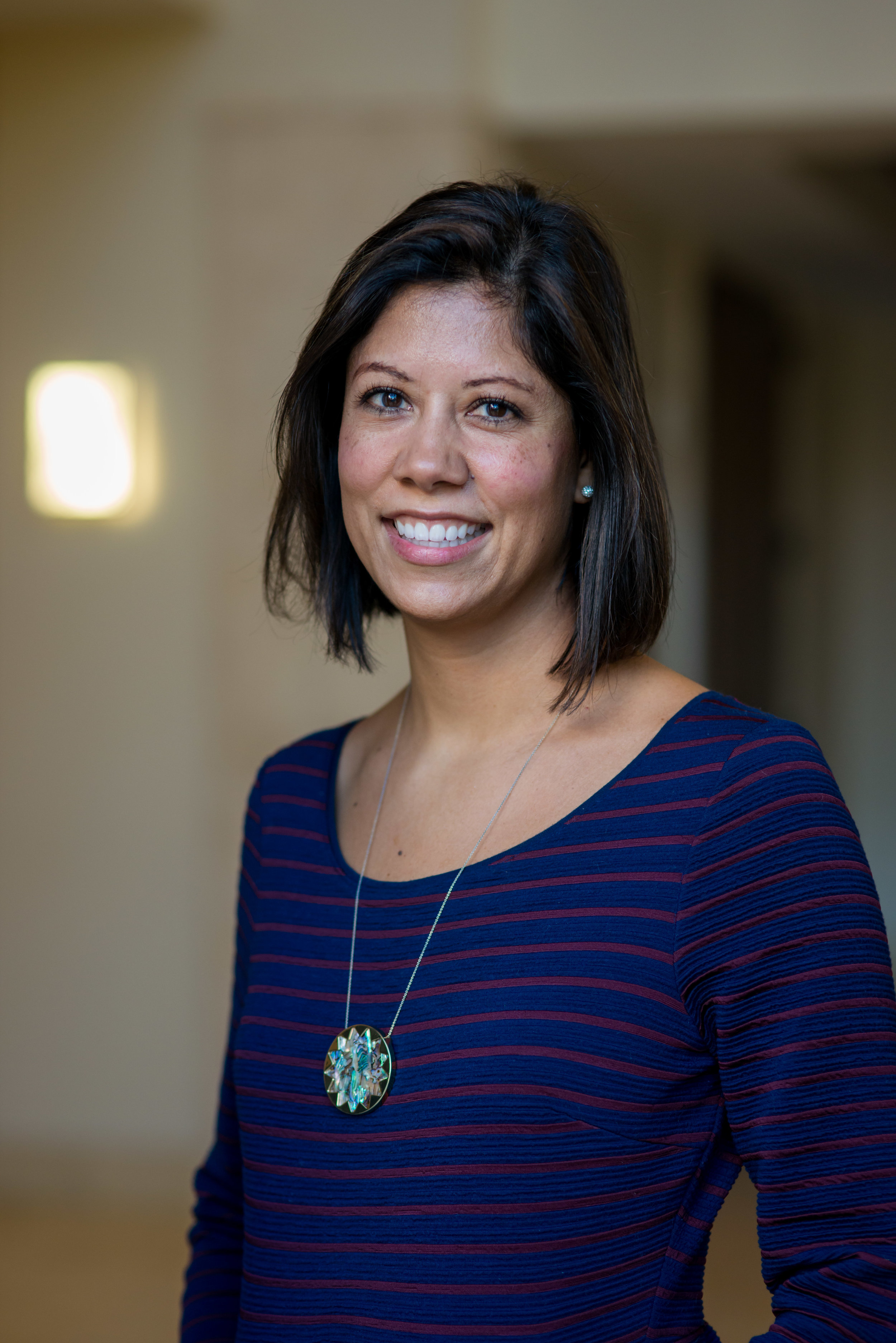
About Amanda Zaidman:
Amanda J. Zaidman is a licensed clinical social worker, mother of two, and owner of Constructive Parenting, PLLC in Charlotte N.C. She received a bachelor degree in psychology from Duke University and a Master degree in Social Work from UNC-Chapel Hill. Amanda is a parenting expert with a background in working with children and parents on social-emotional awareness as a child behavioral therapist. Amanda is a certified STAR Parent Facilitator and has formal training in mindfulness education through Mindful Schools.
Connect with Amanda:
Website:www.constructiveparenting.com
Facebook: www.facebook.com/constructiveparenting/
Instagram: @constructive_parenting
Twitter: @ConstParenting
Pinterest: www.pinterest.com/constparenting/
Linkedin: www.linkedin.com/company/constructive-parenting-pllc
Subscribe
Sign up to get the latest weekly blogs sent straight to your inbox


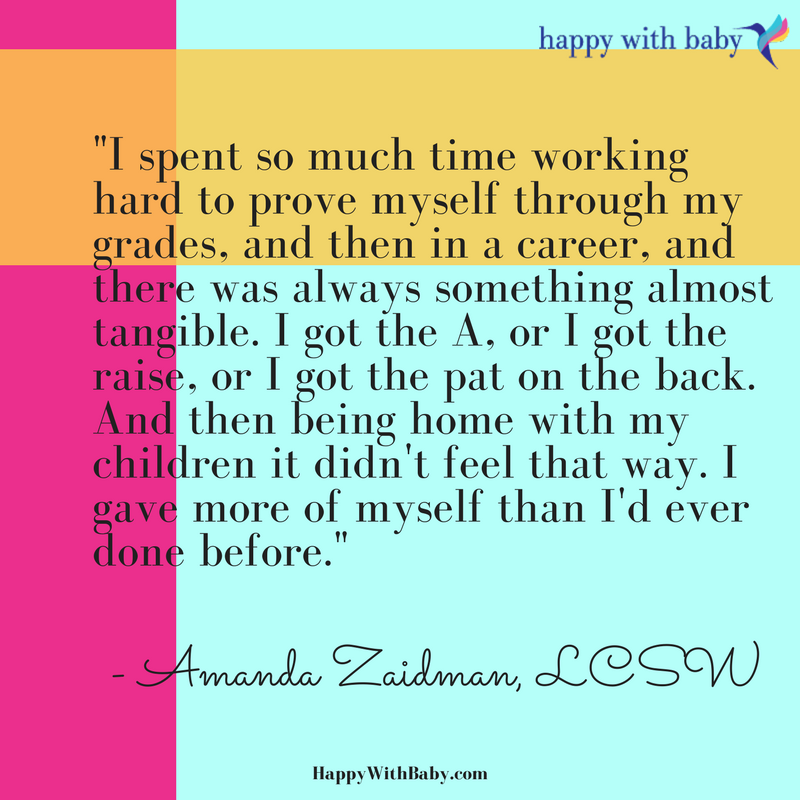
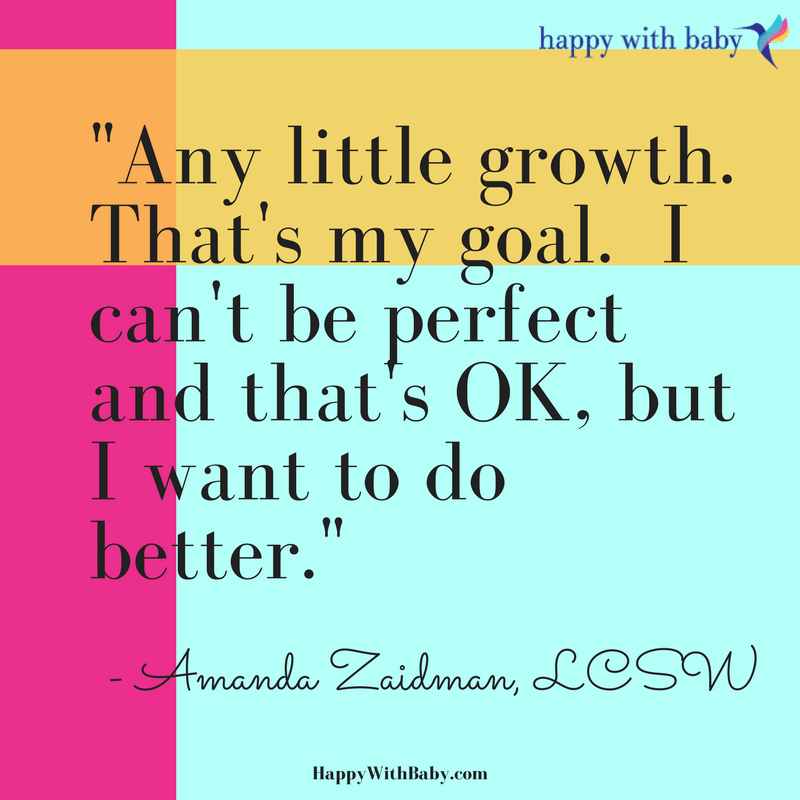
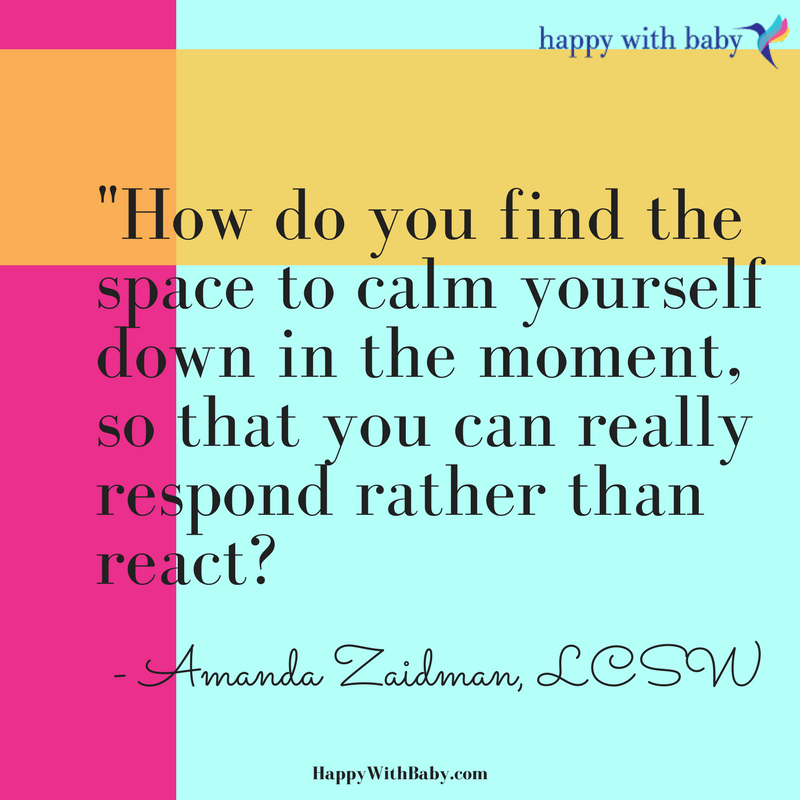
0 comments
Leave a comment
Please log in or register to post a comment